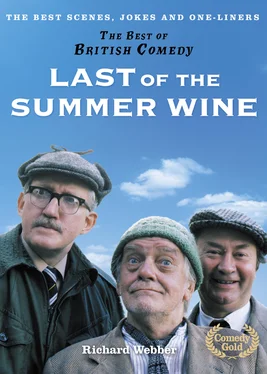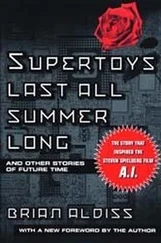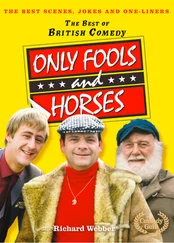Last of The Summer Wine
The Best of British Comedy
The Best Scenes, Jokes and One-liners
Richard Webber
HarperCollins Publishers
Cover Page
Title Page Last of The Summer Wine The Best of British Comedy The Best Scenes, Jokes and One-liners Richard Webber HarperCollins Publishers
INTRODUCTION
THE STORY IN A NUTSHELL
HAIL SMILING MORN OR THEREABOUTS
THE GREAT BOARDING-HOUSE BATHROOM CAPER
CHEERING UP GORDON
FLOWER POWER CUT
WHOOPS
IN THE SERVICE OF HUMANITY
CAR AND GARTER
THE ODD DOG MEN
A BICYCLE MADE FOR THREE
ONE OF THE LAST FEW PLACES UNEXPLORED BY MAN
SERENADE FOR TIGHT JEANS AND METAL DETECTOR
FROM WELLIES TO WET SUIT
ALL MOD CONNED
THE WHITE MANS GRAVE
GETTING SAM HOME
THE LOXLEY LOZENGE
THE MYSTERIOUS FEET OF NORA BATTY
KEEPING BRITAIN TIDY
ENTER THE PHANTOM
CATCHING DIGBY’S DONKEY
UNCLE OF THE BRIDE
THE HEAVILY REINFORCED BOTTOM
DRIED DATES AND CODFANGLERS
THE REALLY MASCULINE PURSE
WHOS FEELING EJECTED, THEN?
EDIE AND THE AUTOMOBILE
MERRY CHRISTMAS, FATHER CHRISTMAS
DANCING FEET
THAT CERTAIN SMILE
DOWNHILL RACER
THE DAY OF THE WELSH FERRET
CRUMS
RETURN OF THE WARRIOR
THE EMPIRE THAT FOGGY NEARLY BUILT
THE LAST SURVIVING MAURICE CHEVALIER IMPRESSION
WAS THAT NORA BATTY SINGING?
THE PHANTOM OF THE GRAVEYARD
HAVE YOU GOT A LIGHT MATE?
STOP THAT BATH
THE GLORY HOLE
ADOPTED BY A STRAY
THE DEFEAT OF THE STONEWORM
BICYCLE BONANZA
HOW TO CREATE A MONSTER
DESTINY AND SIX BANANAS
BEWARE OF THE OGLETHORPE
BEWARE THE VANILLA SLICE
ELEGY FOR FALLEN WELLIES
SURPRISE AT THROSTLENEST
JUST A SMALL FUNERAL
THE MIRACULOUS CURING OF OLD GOFF HELLIWELL
THE CROWCROFT CHALLENGE
I WAS A HITMAN FOR PRIMROSE DAIRIES
TEST YOUR KNOWLEDGE
ACKNOWLEDGEMENTS
Other Books By
Copyright
About the Publisher
Think for a moment about all those classic sitcoms. While the premise, period, setting and style may differ, there are ingredients which are inherent in all of the examples, factors which must be in place if the programme is to rise above the norm and reach the higher echelons of the genre. Without these, the comedy—albeit watchable and likely to occasion a chuckle every now and again—will be just another run-of-the-mill product. Of course, in today’s ruthless world of TV, such offerings wouldn’t get a second glance, let alone a commission.
So what are some of these magical elements which are intrinsically entwined in the fabric of the best sitcoms? If we knew the answer to that we’d been overflowing with scriptwriting millionaires and not have one small-screen turkey to ridicule. But it’s clear when you consider the likes of Dad’s Army , Porridge , Only Fools and Horses , Steptoe and Son , The Good Life , Fawlty Towers et al that there are similarities—and you certainly don’t need to be Einstein to spot them, either. All possess a sterling cast, for starters; performers who are adept in their craft and can bring a script to life with a single glance, a strained twitch, a puff of the cheeks.
Then there is the script itself. A proficient cast needs decent material to work with, and it’s all too easy to forget the person behind the scenes, the creator whose job is to create, time after time, a high calibre script. In such a competitive arena one can only admire the ability of writers to produce an inordinate amount of crisp, rich and humorous material.
No finer example of the aforementioned qualities can be found than in Yorkshire-born Roy Clarke’s scripts. A purveyor of fine dialogue and characterisation, this former teacher and policeman has afforded us the likes of Open All Hours , Keeping Up Appearances and, of course, the delectable Last of the Summer Wine .
If you ever wanted a seamless example of quality writing, acting and production then look no further than Summer Wine , the world’s longest-running TV sitcom. For proof of its popularity and class, just consider how long it’s been entertaining audiences: 36 years. On the surface, the show appears simply to spotlight the daily lives of, primarily, three old men ambling through their autumn years. But, as expected, there is much more to the programme, including a recurring sense of sadness, a feeling of missed opportunities and contemplating the real meaning of life, beautifully expressed through the reflective nature of the leading characters.
DID YOU KNOW?
One of Summer Wine ’s claims to fame is that it was the first British TV comedy recorded in stereo sound.
We’ll be sampling this and much more within these covers. If you want to find out how the series was conceived, discover some interesting facts about the show, learn about the writer’s, performers’ and producer’s experiences, as well as enjoying some of the finest scenes in the long-running sitcom, which extends to over 280 episodes, then settle back and keep reading!
RICHARD WEBBER
It was the 4 January 1973 and a half-hour comedy pilot, ‘Of Funerals And Fish’, had just flickered on to our screens. Nora Batty was chatting with a neighbour when a small van pulled up outside. A man jumped out and disappeared into Bill ‘Compo’ Simonite’s house next-door.
NORA: They’re taking his telly again.
NEIGHBOUR: God, is it Tuesday already?
These lines provided the first breath in the life of a programme which would become a small-screen legend; it’s the doyen of all sitcoms and still going strong, 36 years later. It’s hard to find another sitcom which evokes so many emotions than Roy Clarke’s Last of the Summer Wine. A sense of innocence, humour, contemplation, sadness—they’re all there, embedded in scripts brought to life by a fine bunch of actors, and I’m not just referring to the main cast: even those recruited to play secondary characters or guests roles turned out well-honed performances.
But where Summer Wine scored extra marks is in its delicious setting. Yes, the Pennines, in the heart of Yorkshire, can be rugged, bleak and, as the performers often discovered, exceedingly chilly. But the greenery and fine curves of the rolling landscape provided a wonderful backdrop to the show.
To unearth the origins of the sitcom, we have to travel back nearly four decades to that Comedy Playhouse offering in the depths of winter 1973. Pioneering Duncan Wood, the then Head of Comedy at the BBC, who’d produced such shows as Hancock’s Half-Hour and The World of Beachcomber , had seen Roy Clarke’s comedy drama The Misfit , which between 1970 and 1971 ran to two series on ATV; he regarded the writer as the right man to pen a pilot script he had in mind, even though Roy had established himself, primarily, as a writer of drama.
The premise for the half-hour script centred around the daily goings-on in the lives of three elderly men—not that much happened; for them, it was about trying to fill their very long days with something to occupy their ageing minds, although they fought tooth-and-nail against the onset of old age. For a while, Roy Clarke struggled with the concept and was on the verge of declining the chance to write the pilot script; but then he found a solution to his predicament: by treating the three central characters like juveniles, with carefree attitudes and a sense of freedom akin to the years of adolescence, he created plenty of opportunities to inject humour into the script.
Читать дальше












